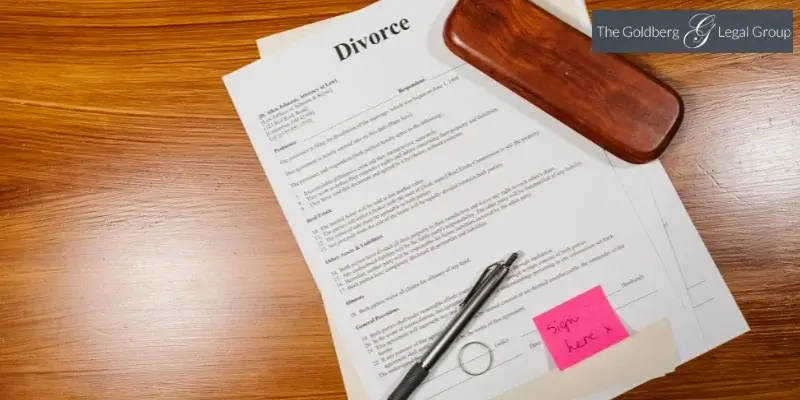Newport Beach Divorce Lawyer
At the Goldberg Legal Group, our skilled Newport Beach divorce lawyers have committed over 18 years to dedicated legal assistance for families in need throughout Orange County, including Newport Beach, Irvine, and Southern California. Our Newport Beach family law attorney understands that every divorce case is unique and may require a different approach depending on your circumstances.
However, we also consider that the foundation of any solid legal representation is a quality, honest, and compassionate attorney-client relationship. For a proper closure, all family legal issues require great attention to detail, which can only be achieved through strong communication and honesty with your lawyer.
As part of the top 100 trial lawyers, attorney David Goldberg is ready to be by your side and provide you with the necessary information to make informed decisions. We are also committed to helping you deal with the stressful realities of a divorce. If you are dealing with any type of family law issue or have a high-asset or contested divorce, we can help. Contact the Goldberg Legal Group at 949-755-0612 for a no-obligation free consultation for your case and have your questions answered!

Newport Beach Divorce Basics
Also known as dissolution of marriage, a California divorce must meet certain conditions before it is considered. When completing paperwork, the partner filing for dissolution will be referred to as the Petitioner, while the other is the Respondent. The conditions are as follows:
- The forms will be filed in the Superior Court of the county where the Petitioner resides.
- The Petitioner must have been a resident of California for at least six months and a county resident for at least three months for a divorce to initiate.
If you are prepared to file for divorce in Newport Beach, CA there are two scenarios you should be ready for.
Contested vs. Uncontested Divorce in Newport Beach
For marital separation there are two types of divorce in California. The difference between a contested and uncontested divorce is in the collaboration between the partners. In other words, if the partners agree on all terms and manage to divide their assets without interference, it is considered an uncontested divorce. However, if there are disagreements, the divorce will be deemed contested. This is because, under California Law, all property will be divided 50/50.
However, this is not always the case and is merely the default rule. For example, if the parties sign a prenuptial agreement before the marriage, they can determine who owns what. However, a divorce attorney can challenge an existing prenuptial agreement if you later file for divorce.
If you want to learn more about your options, contact our office at 949-755-0612 for a free initial consultation! Here is what you should understand about an uncontested or contested divorce in Orange County, California.
Uncontested Divorce
An uncontested divorce is when the couple can agree on all critical issues of their divorce. In most cases, this dissolution in CA takes an average of six months. However, depending on the collaboration of your partner, the process can be even faster, especially if you work with an attorney that can help you complete the paperwork and handle communications with the courthouse via mail. Reaching a beneficiary agreement for both parties can be tricky. Still, there are many ways in which you can achieve this.
One of the most popular and efficient is mediation or collaboration. The first option implies both partners will collaborate with an unbiased third-party mediator, who will guide the negotiation, so they reach a compromise on every issue of the process. The second option, collaborative divorce, is when both parties work with their divorce attorney to settle.
At the Goldberg Legal Group, we understand each couple has unique disputes and disagreements. This is why we are happy to discuss the pros and cons of mediation and collaborative divorces with you. Deciding which option is best depends on several factors.
Contested Divorce
Despite popular belief, the 50/50 law in California can cause many conflicts and disagreements between parties. In a contested divorce, you rely on the courts and a judge’s final decision to determine how your assets will be divided and how custody will work. Most of the time, the most significant problems are child custody, alimony, and debt sharing. Because married partners are considered one legal unit, the state is designed to share property between them as evenly as possible. However, when children are involved, and clients own a family home, the situation becomes even more complicated.
If you and your spouse decide to proceed with a contested divorce, keep in mind it can take anywhere from six months from the date of the petition to years if there are children or many assets involved. Contested divorces also have additional complications, such as jurisdiction issues and hidden assets. Once the court accepts your divorce, the terms and conditions will function like a legally binding contract that is difficult to modify and rectify. With much on the line, it is best to ensure a family attorney represents your best interests at every point of the process.
A contested divorce can be overwhelming and uncomfortable and has many drawbacks. When you rely on the courts to decide for you, you can lose control of your assets and life. This is why working with a Newport Beach divorce lawyer with legal experience is necessary. Here at the Goldberg Legal Group, we work promptly and closely with our clients every step of the way. Together we will analyze the specifics of your situation to determine the most appropriate course of action. Mr. Goldberg himself possesses a great depth of expertise in high-asset divorce and cases involving children. Call us today at 949-755-0612 and request a complimentary consultation to learn more.

Critical Factors in a Divorce in Newport Beach, CA
Each couple comes with its own problems and perspectives, so dissolving marriage has a variety of unique circumstances that must be addressed before the courts can approve the divorce. However, a few aspects of marriage tend to be the apple of “discord” during the divorce process. Let us present to you some of the most common topics of disagreement and the critical factors in divorce.
Division of Assets, Debts, and Properties
If you and your spouse have accumulated community property during the marriage, you must divide all eligible debts and assets appropriately. Before your divorce can be finalized, you must agree on all terms discussed with your attorney or in court. The first step in the division of assets is identifying what is considered community property and what is considered separate property. Even prenuptial agreements can be challenged with the help of an experienced divorce lawyer.
Community Property
In simple terms, community property is what you own or owe together. This includes real estate, pension plans, joint bank accounts, and debt. Under California Law, everything you earn during a marriage is considered community property and must be divided 50/50. This is only if the partners cannot agree before the trial. If a couple can agree to a prenuptial agreement or change originally separate property into a community one, or vice versa, such contracts must be in writing and clearly state the parties’ intentions. Verbally deciding on it will not hold in court.
Separate Property
Separate property is any investment, asset, or debt accumulated outside the marriage period. There are, of course, exemptions to this, such as student debt or inheritance from family members. However, the details must be discussed with your lawyer first. If you are unsure what property is yours and what you must divide, contact our team at the Goldberg Legal Group and schedule a complimentary consultation with us.

How Are Assets Divided in A Divorce in Newport Beach, CA?
During the separation period, the judge will consider several factors when dividing property between divorcing spouses. They aim to achieve an equitable distribution and keep everything as fair as possible. To reach their decision regarding assets, the judge will examine factors like:
- How long has your marriage lasted
- How did each party contribute to the marriage, whether this was bringing in money or supporting the other spouse’s career, or being the one who provided parenting and household duties?
- What will each spouse’s ability to earn income be in the future, and what are their present economic circumstances?
- Are there minor children involved?
- Did one of the partners sacrifice their career or financial benefits for the family?
- Is one of the partners seeking alimony?
- Was there any wrongful conduct by any spouse when they were married?
- Is there a history of substance abuse or domestic violence within the family?
Sometimes, there are complex issues regarding the division of property as well. One example could be if one spouse had an inheritance they kept separately but used the money to deposit into their joint account. Pensions are also divided or earned retirement benefits from a job they left before the marriage. Each of these issues and many more must be resolved before a divorce can be completed. Many considerations will be evaluated to divide the assets fairly. A Newport Beach divorce attorney from the Goldberg Law Group can help you through these tense but essential negotiations. Set up a consultation today to discuss your particular circumstances.
How Does the Date of Separation Affect the Division of the Property?
California law considers separate property as the assets and debts one spouse acquires from the day they separate until the day the divorce is official. The duration of the marriage is calculated from the day of the official wedding until the day of separation. However, the latter is sometimes difficult to determine. Unlike other state laws, in CA, the date is not necessarily when one partner moves out but when a “complete and final break” can be identified. In front of legal authorities, this date is determined by two factors:
- A spouse has expressed to the other spouse their intent to end the marriage, and the spouse acts in a way that’s consistent with their intent to end the marriage.
- If the date of the separation is relevant right before the divorce, or one spouse earned an unusual amount of money or spent a significant amount of money.
In these cases, the separation date becomes an issue, and the judge will examine additional evidence to determine when the couple separated. For example, moving out, opening a separate bank account, or talking with your friends about your marriage being over is valid proof of the timeline. This is why it is crucial to consult with a divorce attorney beforehand. Even in simple legal cases, there can be plenty of unexpected complications and conflicts between spouses. After all, it only takes one person to refuse communication for the process to become chaotic. To reduce the time and effort a divorce can bring, you must choose an experienced lawyer to represent you in trials and negotiations. At the Goldberg Legal Group, we pride ourselves on extensive practice in the field and positive client feedback achieved through honesty, compassion, and communication. If you need to be heard and have your interests protected in the face of legal conflict, contact us today and request a free consultation.

Child Custody, Support, and Visitation
By far, the most challenging part of separation is the children. Divorce can negatively affect your mental health, and legal disputes between the parents are often about who receives child custody. This process can also negatively impact children, especially younger ones. From a legal perspective, minor children must be protected by the state itself during the dissolution of marriage, so their best interests are considered. Child custody is physical custody and the right to make legal decisions for the child. This includes both educational and health-related decisions. Custody is decided in the courts by considering the welfare of the children involved. Even if parents agree on how to split responsibilities, it must be approved by the court.
In addition, your parental plan is required to comply with all requirements imposed by California Law. This includes visitation schedules, financial support, and custody rights. The judge will usually decide after the parents meet with a mediator from Family Court Services. Remember that custody has many hidden aspects, even if you and your partner already agreed on these terms. One example would be that the spouse who gets control will most likely receive the family house, which may cause other disagreements.
Among the issues that play a role in how child custody is determined, the court examines:
- Both parent’s mental and physical capabilities to provide.
- The health and age of each child.
- The child’s relation to each parent and if they have special needs.
- How to preserve the life the children have known up to this point as much as possible, including their schooling, activities, religious affiliation, friends, extended family, and medical care.
- Whether there was a history of substance abuse or domestic violence.
Raising children is not easy, even with both parents involved. However, when a divorce takes place, the entire situation becomes even more complicated. Our divorce lawyer in Newport Beach are ready to take on any child custody issues you may face. We will analyze the situation together to help you with your legal difficulties and represent your rights and your children’s best interest.

Types of Custody Orders
There are two types of child custody in California: legal custody and physical custody. The first one determines who will make the critical decision for the children (ex., Health care, welfare, education, religion). The latter decides whom the children will live with. Let us analyze these two types of custody.
Legal Custody
Legal custody can be further divided into two types, namely joint and solo. Joint custody is when parents share the right and responsibility for the children’s future. On the other hand, solo custody gives only one parent this legal responsibility. These decisions include school or childcare, mental and health care, extracurricular activities, residence, and religious belonging. It is crucial to mention that if both parents share legal custody, they are not required to agree on every decision. Each parent can make individual decisions. However, if you do not want to end up back in court with your former spouse, you should maintain communication and collaboration with your children.
Physical Custody
Like legal custody, physical custody can be structured in two ways: joint or solo. Collaborative or joint custody means the children live with both parents. In contrast, sole or primary custody means children often live with one parent and usually visit the other parent. Joint physical custody is more flexible from a legal point of view because it is challenging for the children to spend exactly half of the time with each parent. However, they often gravitate towards one who will be called the “primary custodial parent” in the long term. Another possible custody outcome after a divorce is joint legal custody, but not a joint physical one. This implies both parents can make decisions for the children’s future, but the child will live with one parent a majority of the time.
As a result, the other parent will have a visitation schedule. Many factors affect how the child’s custody is structured, but it depends on what you want, what your children want, and how your case will be handled. Let your Newport Beach divorce attorney guide and advise you to ensure you receive higher chances of getting the agreement you are hoping for. Our team at the Goldberg Legal Group will prioritize your needs and that of your children and help you keep your relationship with your children healthy, active, and fulfilling. Complete our online form and schedule a no-obligation free consultation today!

Child Visitation
In any divorce involving children, you will hear about child visitation rights. Also known as “time-share,” visitation orders are essential to the parental plan. This aspect determines how the parents share time with the children. Visitation orders and schedules vary depending on the children’s best interests. Generally speaking, there are four types of visitation orders in the state of California, and they are as follows:
Scheduled Parenting Time
This type of legal order is helpful for preventing conflict and confusion within the family. Both parents and children have detailed plans of when an interaction will happen and how. For example, visitation programs may include holidays, special occasions, vacations, and other important dates for the family. For this to work, the court and the parents will devise a schedule detailing the dates and times the children will be with each parent.
Reasonable Visitation
For a proper visitation order, it is not necessary to have a detailed plan about how the children will spend time with their parents. Usually, these orders are open-ended, allowing the parents to work it out between them. This type of order is only possible if the parents collaborate well and are open to communication. However, if the former spouses fail to collaborate efficiently, the children will suffer in the long term.
Supervised Visitation
If the situation in the family is tense or there are significant problems, a supervised visitation order will be ruled out for the safety of the children. This means visits from the other parent must be supervised by you, another adult, or a professional agency. This order is issued if the child needs time to become more familiar with one of the parents. For example, if one of the parents is often absent, the child would need to accommodate and slowly get to know the other in a safe, supervised manner.
No Visitation
The most extreme type of decision in family court, restriction orders, are only issued if the safety and well-being of the children are threatened by the presence of one of the parents, even with supervision. For example, this option is used if one of the spouses has a history of domestic violence, substance abuse, or an active criminal record. In these cases, it is in the children’s best interest to have no contact with them. Spending time with your children is an essential part of their childhood and your parenthood. If you want to ensure you get as much time as possible with your children or deny your abusive spouse this right, you must be completely honest about your situation with yourself and your lawyer.

Child Support
In addition to custody, you need to decide how each parent will contribute financially to the children’s life. Typically, the parent with the higher income will pay support to the other parent. However, the final determination depends on several factors, including who has physical custody, the payment of each parent, and more. Here is what you should consider:
Obtaining Child Support
Financial help is a legal requirement that both parents must be obliged to, regardless of their marital status. It is a safe way to secure an adequate lifestyle for their children, and in the process of a divorce, it will play a significant role. Under California law, there are multiple ways of filing for child support. The process will include the following:
- The calculation of the money needed
- The approval of the court
- Future possible alterations
The state provides an online child support calculator for parents to calculate their gross income and the needed time and cost for the child. Working with your attorney will ensure the best outcome for you and your children. Parenthood should be joyful, so let someone with legal knowledge represent your best interests. If you are experiencing domestic violence in your marriage, here is what it means in your divorce proceedings:
Domestic Violence
Under California Law, domestic violence is considered abuse, defined as the actions of one marital partner toward another: intentional or reckless conduct that causes or almost causes bodily injury or threatens imminent serious bodily injury to the spouse or another. However, California has interpreted these actions differently, leading to the following steps being classified as domestic violence.
- Physical abuse
- Emotional abuse
- Sexual assault
- Harassment/stalking
- Intimidation/threats
- Isolation by restricting movement/communication
- Deprivation of necessities
- Limiting access to financial resources
Home-sharing relationships, including marriage, are covered in California by domestic violence laws. In other words, crimes committed behind closed doors will be considered in any legal decision and punished by the legal authorities. Naturally, abuse becomes a matter of safety during and after the spouses’ separation. Therefore, judges must be cautious when ruling on these cases. The future security of the abused spouse and the rest of the immediate family becomes an immediate priority.
More recently, there have been legal petitions demanding limitations on freedom or other controlling behaviors to be classified as domestic violence. Judges must consider any evidence of violence when ruling on restriction orders. Proving that you experienced domestic violence is not as complex as a criminal trial. However, if your spouse attempts to hide it, a divorce attorney can help you gather evidence properly and assist you.

How Does Domestic Violence Affect Divorce Proceedings?
Ensuring a safe future for you and your children is a difficult challenge without legal support. Working with a divorce attorney from the Goldberg Legal Group will increase your chances of getting justice and restoration. We will fight fiercely if you or your children are domestic violence victims. Domestic violence is a traumatic experience for all parties involved, but you should not let that prevent you from reaching out and discussing the details of your case with us. If, during a divorce the court finds evidence of domestic violence, it can significantly impact how the separation will be carried out. This includes child custody and property division. If minors are involved, family court judges have the legal power to decide in favor of the children and the abused spouse. A judge can also make a spousal support order in a divorce, legal separation, or domestic violence restraining order case.
Child Custody and Domestic Violence
In California, the state will prioritize the interest of minor children during custody battles, especially in domestic violence situations. According to the law, placing a child in a home with domestic violence is considered harmful and damaging, even though constant and frequent contact with both parents is encouraged. California Family Code Section 3044 states that judges can have a rebuttable presumption about anyone with a criminal record of domestic violence within the last five years. If the abusive spouse brings enough evidence to the judge to prove a changed behavior, the court will consider the following factors.
- Evidence of a better lifestyle for the children if custody is awarded to the abusive partner.
- Evidence of successful completion of treatment, education, or counseling programs
- Proof of compliance with the required probation or parole periods
- Violations of restraining orders
- Incidents of recent domestic violence
Effects of Domestic Violence on Property Divisions
Property accumulated during the marriage is often divided by the 50/50 rule in California, but this is not a certainty. Community property, as it is referred to, can be divided differently if one of the spouses is found guilty of domestic violence. If the context is deemed favorable, the judge may determine one partner is entitled to a more significant share of community property than previously awarded. Regarding debt or financial requirements, such as child support or alimony, spouses convicted of domestic violence are far less likely to receive monetary help. On the contrary, if the judge deems it necessary, the abuser will have to pay reparations besides the mandatory child support. If your ex-spouse attempts to conceal or outright deny their abusive behavior, or if you do not know exactly if what they do constitutes domestic violence, speak with our attorneys and be open about your situation. With over 18 years of experience in family law, the Goldberg Legal Group can easily identify any factors of an abusive relationship. Call us right away if you are planning a divorce due to domestic violence.

Alimony and How It Works?
Spousal support (also known as alimony) is a court payment order from one spouse to help them adapt to their new financial circumstances after the divorce. Most cases include domestic partners that have been financially dependent on the other spouse and now need financial support. In different marital situations, having a prenuptial agreement has become increasingly common. However, even in those cases, a judge must review and approve any agreements.
What Factors Impact Spousal Support in California?
Although spousal support is not as common as it used to be, there are still situations where a court will rule in favor of it. In cases where merit to support an award exists, the following factors will be considered.
- How long did the marriage last
- The age, health, and income of the spouses
- If there are minor children involved
- The standard of living of the married couple
- Whether the party seeking alimony sacrificed their own career goals to support their spouse’s
- Whether the requesting spouse can maintain gainful employment without harming the best interests of their children
- Each spouse’s financial assets and debts
- The payee’s ability to support the payments
- Evidence of domestic violence
- Any factor the court deems just and equitable
If you wish to opt for alimony, have a clear understanding of how it works, and raise your chances of receiving it, contact our divorce attorneys at the Goldberg Legal Group right away. Schedule a free consultation with no obligations today, and have a clear grasp of your legal situation. Here is what you should know generally know about alimony in California:
Types of Alimony in California
Two types of alimony are recognized in California:
- Temporary spousal support
- Long-term spousal support
Each is determined based on the duration of the former marriage. For marriages that lasted less than ten years, the alimony period is set as half the length of the marriage. Partners can request support modifications as it is active. Once the active period is over, courts no longer have the jurisdiction to revisit them. Marriages over the ten-year mark have different regulations. California judges can review and modify these alimony orders indefinitely if either spouse requests a revision or until the supported spouse remarries or dies. Despite popular belief, no “Ten Year Rule” entitles the supported spouse to alimony for life in this state. The only exemption from the standard rule is if both parties agree to make the alimony “non-negotiable”.
If you want to protect your business or investments or be compensated for your losses during the marriage, you should consult with your attorney before making any decisions. Our team at the Goldberg Legal Group will assist you with your legal challenges and protect your interests during the trial and in the long term.

Contact Our Divorce Attorney in Newport Beach, CA
The family legal system is complicated, with many hidden clauses and problems. The stakes for most people are very high, and apart from this, divorce and the division of your family can be a traumatic experience for everyone. If you need proper child support or a fair division of debt and property, you must work with a lawyer to protect your interests. In such a stressful situation, people often make huge mistakes, such as making important financial decisions or insulting their spouses online. These actions can have a disastrous impact on your divorce proceedings. However, a lawyer that is by your side and has your best interests in mind will prevent you from making such mistakes.
With over 18 years of experience in family law shining through honesty and compassion, the attorneys at The Goldberg Legal Group assist clients in the Newport Beach area and Orange County with their family law needs. We are here to listen to your specific divorce details and offer you the legal advice you require in an honest, upfront, and compassionate manner. Call us today to schedule a free consultation on your case and learn more about family law in California.
Newport Beach Divorce Resources
- Average Cost of a Divorce in California
- How Long Does a Divorce Take in California?
- How Long Do You Have To Be Separated Before Divorce In California?





